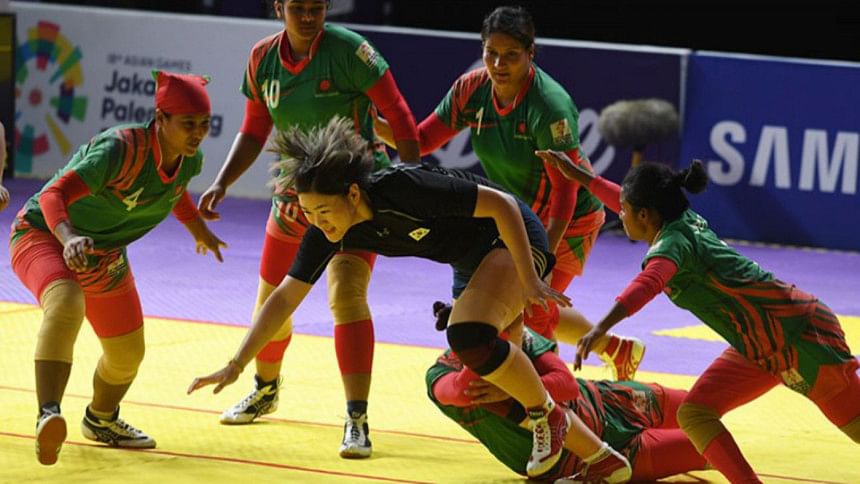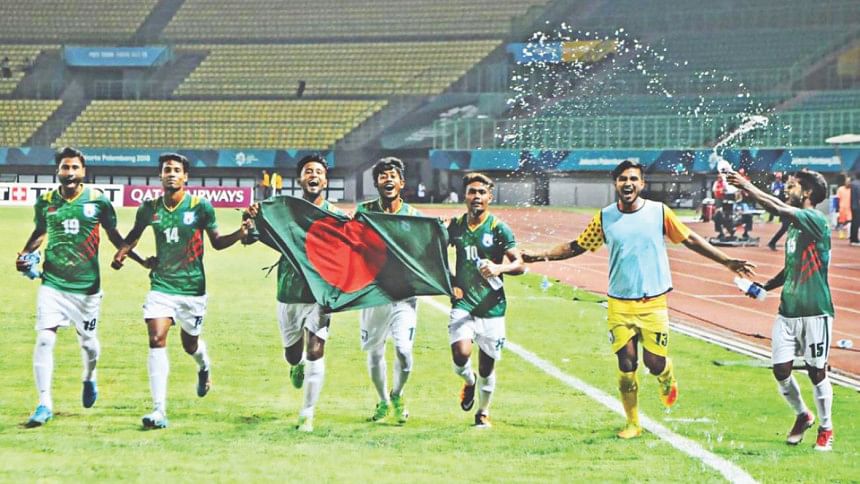The Good, the Bad and the Ugly

As we wrap up 2018 and look forward to a new year, Bangladesh's search continues for a sport or sporting icon, barring cricket, which we can feel really proud of. There were sporadic successes in several sports at the regional level this year, but unfortunately we are yet to find an individual or a team that can give us an assurance of sustained success at the international level. And signs are that the status quo is not likely to change soon as 2018 brought more news of disappointment than celebration. To make matters worse, there were a few truly dark incidents taking place within the sporting community that posed serious questions about the integrity and dignity of the sporting establishment.
The Good
Most of the good news in sport came from football, more specifically from age-group football. The boys' triumph in the SAFF U-15 Men's Championship, the girls' in the SAFF U-18 Women's SAFF Championship and a runners-up finish by the girls in the SAFF U-15 Women's Championship, followed by the same team's qualification for the second round of AFC U-16 Women's Qualifiers were some of the brighter points of footballing success. There was also notable success at the senior level as the Bangladesh Olympic team for the first time in history reached the second-round of the Asian Games, beating Qatar after holding Thailand to a draw following an opening-game defeat against Uzbekistan. Bangladesh were eventually beaten by last edition's runners-up North Korea in the last 16, but their performance gave the booters belief that they could fight shoulder-to-shoulder against opponents of much higher calibre.

Although the national team could not quite replicate the performance of the Olympic team in the two subsequent campaigns at home, the spirit and heart shown by them in the SAFF Championship and the Bangabandhu Gold Cup was a refreshing change to football fans after a few of years of disappointment.
The hockey team's performance in the Asian Games, where they finished sixth for the first time since 1978, was another bright spot.
Among the other notable achievements were FIDE Master Fahad Rahman earning his first IM norm and Bangladesh doing relatively well in regional handball, volleyball, basketball and archery events. From an organisational point of view there were quite a few positives, including the hosting of a number of international events and successfully staging the first Bangladesh Youth Games.
The most notable success from individual sports came from shooting in the Gold Coast Commonwealth Games in Australia, where the country's best shooter, Abdullah Hel Baki, followed up his silver medal in the 2014 Games with a silver medal in men's 10m air rifle event, narrowly missing out on a maiden gold, while Shakil Ahmed won a silver medal in men's 50m pistol event.

The Bad
To be fair, the Commonwealth Games remains a league far below world standard, with many of the top performers of the world not present there. So the hype surrounding the two silver medals earned in shooting was quickly ended when the Bangladesh shooting team failed miserably in the Asian Games in Indonesia, with none of the shooters making it to the eight-man finals in any of the events.
And that theme recurred across 14 of the disciplines that Bangladesh participated in at the Asian Games, with a total of 117 athletes taking part.
Kabaddi, the national sport, was the epitome of the decadence of our sporting achievement. A saving grace for the past 32 years, kabaddi this time failed to earn a medal from Asia's biggest multi-discipline sporting event, thereby extinguishing hopes of any medal for Bangladesh from the games for the first time since 1982.
The Ugly
The Commonwealth Games revealed a picture of callousness and negligence of Bangladesh officials as two participating boxers were suspended from taking part due to sheer negligence of the team coach. The coach forgot to attend the technical meeting the day before the events, prompting the Games' authority to exclude Bangladesh from the roster.

One of the members of Bangladesh's journalist contingent went missing soon after reaching Australian shores. It was later found out that the missing person was not a journalist at all, rather a random individual who had used the Games as a means for illegal migration by forging documents with the assistance of a sports journalist.
In July, a member of Bangladesh's Special Olympics Unified Football team went AWOL from his team hotel in Chicago, only to be found a few days later at the home of one of his relatives in Ohio. The transgressor was sent home by the Bangladesh contingent, but these two incidents left a black spot on the image of the country, reviving memories of a time when defecting from foreign tours used to be commonplace among sports representatives from the developing world.
However, the worst revelation that hit the sporting fraternity came in November when a Bengali daily unearthed the case of an alleged rape, which had taken place a couple of months previously in the confines of the country's apex sporting establishment, the National Sports Council. The victim was a teenage weightlifter and the alleged perpetrator an office assistant of the Bangladesh Weightlifting Federation.
The details of the incident and its aftermath were chronicled by leading newspapers, much to the shock and horror of the public even though it is common knowledge that such incidents have taken place in the past under the eyes of the powers that be or, in cases, by the ones who yield power.
It is believed that the incident revealed by the family of the victim, who underwent treatment for mental trauma, is only tip of the iceberg, with a great majority of such incidents being swept under the carpet.
These transgressions take place because most of the athletes of our country come from needy families, clinging on to the sport that they feel can give them a life worth living. It is perhaps high time that the financial and personal security of these sporting individuals is ensured before expecting success from them.

 For all latest news, follow The Daily Star's Google News channel.
For all latest news, follow The Daily Star's Google News channel. 



Comments